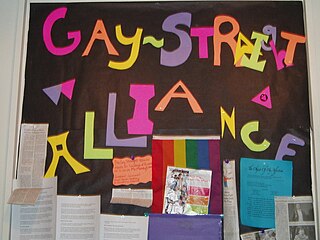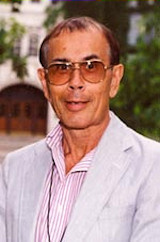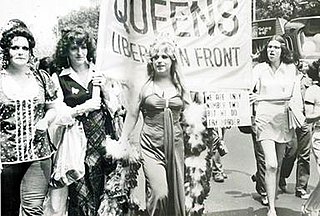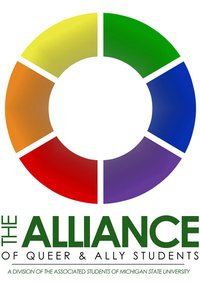The Billy DeFrank LGBTQ+ Community Center is a non-profit organization that promotes services for and about the LGBT community of San Jose and Santa Clara County, California. The mission statement of the DeFrank Center is to provide "community, leadership, advocacy, services and support to the Silicon Valley’s LGBTQ+ People and their Allies."

Center on Halsted is a lesbian, gay, bisexual, and transgender (LGBTQ) community center in Chicago, Illinois.

A gay–straight alliance, gender–sexuality alliance (GSA) or queer–straight alliance (QSA) is a student-led or community-based organization, found in middle schools, high schools, colleges, and universities. These are primarily in the United States and Canada. Gay–straight alliance is intended to provide a safe and supportive environment for lesbian, gay, bisexual, transgender, and all LGBTQ+ individuals, children, teenagers, and youth as well as their cisgender heterosexual allies. The first GSAs were established in the 1980s. Scientific studies show that GSAs have positive academic, health, and social impacts on schoolchildren of a minority sexual orientation and/or gender identity. Numerous judicial decisions in United States federal and state court jurisdictions have upheld the establishment of GSAs in schools, and the right to use that name for them.
A straight ally, heterosexual ally, or cis ally is a heterosexual and cisgender person who supports equal civil rights, gender equality, and LGBTQ+ social movements. Individuals may meet this designation through their actions without actively identifying as an ally.

LGBTQ culture is a culture shared by lesbian, gay, bisexual, transgender, and queer individuals. It is sometimes referred to as queer culture, while the term gay culture may be used to mean either "LGBT culture" or homosexual culture specifically.
The origin of the LGBT student movement can be linked to other activist movements from the mid-20th century in the United States. The Civil Rights Movement and Second-wave feminist movement were working towards equal rights for other minority groups in the United States. Though the student movement began a few years before the Stonewall riots, the riots helped to spur the student movement to take more action in the US. Despite this, the overall view of these gay liberation student organizations received minimal attention from contemporary LGBT historians. This oversight stems from the idea that the organizations were founded with haste as a result of the riots. Others historians argue that this group gives too much credit to groups that disagree with some of the basic principles of activist LGBT organizations.
Street Transvestite Action Revolutionaries (STAR) was a gay, gender non-conforming and transvestite street activist organization founded in 1970 by Sylvia Rivera and Marsha P. Johnson, subculturally-famous New York City drag queens of color. STAR was a radical political collective that also provided housing and support to homeless LGBT youth and sex workers in Lower Manhattan. Rivera and Johnson were the "mothers" of the household, and funded the organization largely through sex work. STAR is considered by many to be a groundbreaking organization in the queer liberation movement and a model for other organizations.

James Willis Toy was a long-time American activist and a pioneer for LGBT rights in Michigan.

LGBT movements in the United States comprise an interwoven history of lesbian, gay, bisexual, transgender and allied social movements in the United States of America, beginning in the early 20th century. A commonly stated goal among these movements is social equality for LGBT people. Some have also focused on building LGBT communities or worked towards liberation for the broader society from biphobia, homophobia, and transphobia. LGBT movements organized today are made up of a wide range of political activism and cultural activity, including lobbying, street marches, social groups, media, art, and research. Sociologist Mary Bernstein writes: "For the lesbian and gay movement, then, cultural goals include challenging dominant constructions of masculinity and femininity, homophobia, and the primacy of the gendered heterosexual nuclear family (heteronormativity). Political goals include changing laws and policies in order to gain new rights, benefits, and protections from harm." Bernstein emphasizes that activists seek both types of goals in both the civil and political spheres.
This is a list of notable events in the history of LGBT rights that took place in the 1970s.
Lesbian, gay, bisexual, transgender (LGBT) affirming denominations in Judaism are Jewish religious groups that welcome LGBTQ members and do not consider homosexuality to be a sin. They include both entire Jewish denominations, as well as individual synagogues. Some are composed mainly of non-LGBT members and also have specific programs to welcome LGBT people, while others are composed mainly of LGBT members.
Gordon L. Thomas was the mayor of East Lansing, Michigan, from 1961 to 1971. He was a Democratic candidate for delegate to a constitutional convention to rewrite the Michigan Constitution during 1961 and 1962 from Ingham County's second district.
Services and Advocacy for Gay, Lesbian, Bisexual, and Transgender Elders (SAGE) is America's oldest and largest non-profit organization dedicated to improving the lives of lesbian, gay, bisexual, transgender and queer or questioning (LGBTQ+) older people, focusing on the issue of LGBTQ+ aging. According to its mission statement, "SAGE leads in addressing issues related to lesbian, gay, bisexual, transgender, queer and questioning aging. In partnership with its constituents and allies, SAGE works to achieve a high quality of life for LGBTQ+ older people, supports and advocates for their rights, fosters a greater understanding of aging in all communities, and promotes positive images of LGBTQ+ life in later years." SAGE is a 501(c)(3) organization that focuses on advocacy on the local and federal levels, as well as activities, groups, and programs that encourage LGBTQ+ older people to stay connected with each other and the community.
The Spectrum Center is an office at the University of Michigan in Ann Arbor that is dedicated to providing education, outreach, and advocacy for the lesbian, gay, bisexual, transgender, queer, and allied (LGBTQA) community. Since the organizations' creation in 1971, the Spectrum Center's mission statement has been to "enrich the campus experience and develop students as individuals and as members of the LGBTQA community." The organization achieves this through student-centered education, outreach, advocacy and support.

Historically speaking, lesbian, gay, bisexual, and transgender (LGBTQ) people have not been given equal treatment and rights by both governmental actions and society's general opinion. Much of the intolerance for LGBT individuals come from lack of education around the LGBT community, and contributes to the stigma that results in same-sex marriage being legal in few countries (31) and persistence of discrimination, such as in the workplace.
The Michigan Organization for Human Rights was a Michigan-based civil rights and anti-discrimination organization. It was founded in 1977 and disbanded in 1994, with most of its assets transferring to the University of Michigan Bentley Historical Library, Affirmations LGBT community center of Ferndale, and the Triangle Foundation—which replaced MOHR as the state's LGBTQ civil rights organization.
Ronni Lebman Sanlo is the Director Emeritus of the UCLA Lesbian Gay Bisexual Transgender Center and an authority on matters relating to LGBT students, faculty and staff in higher education. She recognized at an early age that she was a lesbian, but was too afraid to tell anybody. Sanlo went to college then married and had two children. At the age of 31, Ronni came out and lost custody of her young children. The treatment toward the LBGT community and her rights as a mother are what gave Sanlo the drive to get involved in activism and LGBT politics.

Queens Liberation Front (QLF) was a homophile group primarily focused on transvestite rights advocacy organization in New York City. QLF was formed in 1969 and active in the 1970s. They published Drag Queens: A Magazine About the Transvestite beginning in 1971. The Queens Liberation Front collaborated with a number of other LGBTQ+ activist groups, including the Gay Activists Alliance and the Street Transvestite Action Revolutionaries.







